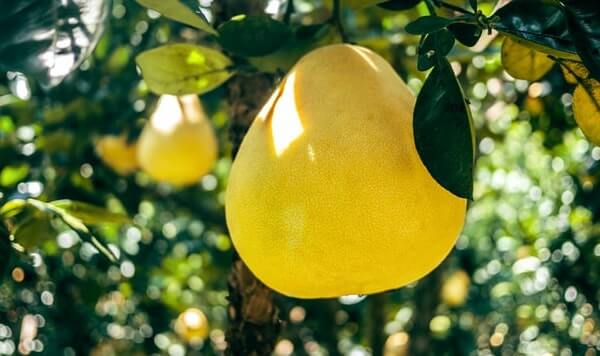
Yes, dogs can eat Pomelo but in moderation. They should only have a few bites 3 to 4 times a week and no more than that. Dogs should not eat Pomelo daily and it should only be an occasional treat. Make sure your pooch is only eating the flesh of the fruit and avoid the skin, leaves, and seeds.
Many fruits and vegetables that are rich in vitamins, minerals, fiber, and proteins are generally safe for canines to eat. Let’s explore what Pomelo is and how a little bit of it can help improve your dog’s health.
Table of Contents
What is Pomelo?
Pomelo is a large citrus fruit grown in Southeast Asia. The fruit is also called Chinese grapefruit. It tastes like lemon but with a peculiar sweetness. Some people called it pumelo or pommelo.
While Pomelo is similar in size to grapefruits, they can grow even bigger to the size of a watermelon. Compared to grapefruit, Pomelo is sweeter and has a more lemony taste.
Speaking of grapefruit, many think that these two fruits look the same. Let’s dive deeper and learn the difference between the two fruits.
Are Pomelo and grapefruit the same?
No, Pomelo and grapefruit are two different fruits.
Grapefruit is a crossing of Pomelo and an indigenous orange. When ripe, Pomelo is either yellowish or orange in color with green oil poles. On the other hand, grapefruit is reddish yellow in color.
Grapefruit is round, while Pomelo has a teardrop-like shape similar to chestnuts. Pomelo is also the largest citrus fruit.
It’s understandable that most people are confused between these two fruits, but they do differ in taste, nutritional value, and shape. Even the bitterness, sweetness, and tartness of these two fruits varies a bit.
Is Pomelo safe for dogs?

Yes, Pomelo is safe for dogs. Similar to vegetables and other citrus fruits, Pomelo is rich in vitamin C which is vital for your dog. However, your pooch should feed on it in moderation as it is also rich in sugar. Excessive sugar consumption can result in diarrhea and stomach discomfort.
Also, the acidity of Pomelo, though not as high as lemon or grapefruit, can still bother most dogs.
Health benefits of Pomelo for dogs
Pomelo is a juicy fruit containing vital vitamins, minerals, proteins, and fibers that can be of great help to your canine friends. Below we are going to check out some of the benefits your dog can get from eating Pomelo:
- Enhance muscle health because of the protein present in the citrus fruit.
- Improve digestion. The dietary fiber in the Chinese grapefruit enhances food digestion and prevents constipation in dogs.
- Weight loss. Though a big and plump dog looks healthy, excess weight can be very harmful to your dog’s health. Excess weight can put pressure on a dog’s joint and bone. An obese dog will often appear dull and inactive.
- Boost your dog’s immunity. The vitamin C in Pomelo fruit helps in fighting disease-causing microorganisms so it protects your dog from getting ill.
- Reducing inflammation. The lycopene antioxidant in Pomelo lowers inflammation in dogs.
- Relieve oxidative stress thanks to the antioxidants present in Pomelo.
Pomelo may have other health benefits in addition to the list above. It is important to note that you should not feed your dog too much Pomelo as too much of anything, no matter its merits is dangerous to dogs.
Nutrient benefits of Pomelo for dogs
Pomelo is rich in nutrients that can benefit your dog a lot. Since we have established that it is safe to feed your dog Pomelo, let’s go over the nutrient benefits of Pomelo for dogs:
- Dietary fiber. Help in enhancing digestion and colon health in dogs.
- Pomelo contains minerals like potassium and copper, which help with your pup’s enzymes functioning, nerves, and muscles.
- Vitamin C. All citrus fruit contains vitamin C, Pomelo included. It boosts the immunity system.
- Protein. Pomelo is rich in protein and aids in strengthening your dog muscles.
- Antioxidants. Contain three oxidants, namely: lycopene, naringin, and naringenin. They help to relieve oxidative ailments and enhance your canine’s heart health.
- Fight bacteria and fungi in dogs.
How much Pummelo fruit can your dog eat?

Generally, treats or snacks should only be 10% of your dog’s daily consumption. Since Pomelo is a fruit and high in calories, it should fall under this category. Again, you should not give this sweet fruit to your pooch every day. A few bites of the flesh 3 to 4 times a week should be enough.
Moderation is vital when feeding Pomelo fruit to your dog
Though Pomelos fruit is not toxic for your dog, it can be harmful if consumed in large amounts. Pomelo contains too much sugar, which can cause obesity and upset stomachs in dogs.
The citric acid present in the fruit can also be a source of discomfort to your four-legged friends. To prevent any potential health problems, it’s best to give Pomelo to your pooch as an occasional treat.
Pomelo calories
Let’s go over the calories in this sweet fruit, Pomelo:
- 231 calories.
- 59g of carbohydrates.
- 6.1g of fiber.
- 4.6g of protein.
- 0.2g of fat.
- 6.1mg of sodium.
- 116mg of vitamin C.
An active dog will have no problem burning these calories.
Remember that the recommended treat intake for dogs should be less than 10% of their total daily consumption.
How to feed Pomelo to your dog
To ensure that your dog doesn’t consume the toxic parts of Pomelo, you should only give the flesh portion of the Pomelo to your canine friends. Note that the leaves, seeds, and skin of this Chinese grapefruit are not safe for your pooch.
Check out the detailed guide below on feeding Pomelo to your canine:
- Remove any leaves from the Pomelo and wash it thoroughly.
- Peel off the thick outer skin.
- Remove the membrane surrounding each section to expose the meat inside.
- Remove the seeds.
- Place the flesh sections of the fruit in your dog’s bowl one by one.
- Observe as your dog eats in moderation.
Can a dog be allergic to Pomelo?
Yes, dogs can be allergic to any food in general. It all depends on each individual dog. Since Pomelo fruit contains a high level of acid, it isn’t out of the question that it can result in allergies.
The best thing to do is begin feeding your dog very small amounts of Pomelo and watch out for any allergies. Possible symptoms include indigestion and skin itching.
If your dog is fine after eating Pomelo and does not show any allergic reactions, then you can continue to give this fruit to them.
Is Pomelo toxic to dogs?

No, Pomelo is not necessarily harmful to your dog. It is important to note that the seeds, skin, and leaves of Pomelo are toxic, though.
Still, the fruit can be dangerous to some dogs, especially to puppies. Giving Pomelo to puppies can cause them diarrhea or vomiting. The fiber content of the fruit is not suitable for your younger dog.
What happens if your dog eats too much Pomelo?
Eating too much Pomelo can cause food poisoning in dogs. Though the citrus plant’s essential oils and phototoxic compounds are healthy for humans, they are toxic to canines if consumed excessively.
Below are possible symptoms to indicate that your dog has consumed excess Pomelo:
- Diarrhea.
- Vomiting.
- Collapse.
- Lethargy.
- Abnormal drooling.
- Tremors.
- Weakness.
- Skin irritation.
If not treated in time, your dog may experience the severe side effects below:
- Depression.
- Liver failure.
- Low blood pressure.
Treatments if your dog has Pomelo poisoning
Signs of diarrhea, vomiting, collapsing, and tremors are enough to know your canine friend has food poisoning from consuming too much Pomelo fruit. These are clear indications that your dog needs urgent vet attention as any delays may advance effects.
Treatment
- Remove Pomelo essence on your dog’s skin. Use mild soap and water to wash any skin or hair that was exposed to the Pomelo fruit. Dog scratching and skin irritation will guide you where to clean.
- Gastric irrigation. The vet performs gastric irrigation to extract as much as possible poisonous Pomelo substance from your dog’s digestive system.
- Administration of activated charcoal. Activated charcoal counters any more accumulation of the toxin components into your dog’s bloodstream.
Note that inducing vomiting without your vet’s supervision can be harmful to your dog’s lungs.
Citrus poisoning can lead to phototoxicity; therefore, shielding your dog from naked sunlight is recommended for at least two days. Check your pup’s blood level frequently. Abnormal pressure indicates possible danger to your canine’s vital organs, such as the liver.
Dog-friendly alternatives to Pomelo
As always moderation is key when feeding Pomelo to your canine. It’s best to feed them a few flesh of this fruit a few times a week. If you’re eating your Pomelo and your canine is giving you that puppy eyes, there are other canine-friendly alternatives you can give to your four-legged friend instead of more Pomelo.
We provide our Labrador this crunchy fruit treat whenever we’re having Pomelo:
So, can dogs eat Pomelo?
It is safe for dogs to eat Pomelo provided that they only take occasional bites of the fruit here and there. We have found that protein, dietary fiber, vitamin C, and antioxidants in Pomelo are beneficial to your dog’s health.
If your canine consumes too much Pomelo, the high levels of calories and acid present in the Chinese grapefruit can be overbearing. As long as you don’t overdo it, your dog can enjoy this juicy fruit.
Related Questions
No, Pomelo skin is toxic to dogs. It contains a high concentration of harmful substances, especially phototoxic compounds, oils, and citric acid.
After consuming the peels, the dog may experience unpleasant discomfort in the digestion channel. Always peel the skin of the fruit off first and feed just a small amount of flesh to your pup. Keep the skin out of your pup’s reach.
Yes, dogs can eat citrus fruit but not all. Orange and Pomelo are safe for dogs if fed in moderation. The vitamin C and fiber present in these fruits aid in disease protection and smooth digestion, respectively.
However, tangerine, lemon, and grapefruit are considered toxic for dogs. They contain excess acid that the dog’s body cannot hold.
DISCLAIMER: THIS WEBSITE DOES NOT PROVIDE MEDICAL ADVICE
The information, including but not limited to, text, graphics, images and other material contained on this website are for informational purposes only. No material on this site is intended to be a substitute for professional veterinary advice, diagnosis, or treatment. Always seek the advice of your veterinarian or other qualified health care provider with any questions you may have regarding dietary needs.
Resources:
https://www.healthline.com/nutrition/pomelo-fruit#_noHeaderPrefixedContent
https://www.akc.org/expert-advice/health/dog-allergies-symptoms-treatment/

With over five years of specialized experience as an animal writer, my expertise lies in dog nutrition, health, behavior, grooming, and training. I am dedicated to delivering helpful and informative content that caters to the well-being of our furry friends. My primary goal is to empower pet owners with knowledge and ensure our canine companions thrive in health and happiness. In my free time, I love volunteering at local dog rescue centers.









